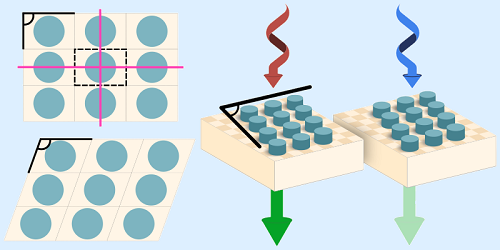• Physics 17, s135
Contrary to conventional wisdom, a lattice of engineered nanoparticles called meta-atoms can have a chiral optical response even when each meta-atom is not chiral.
I. Toftul/Australian National University
An array of artificial nanostructures known as meta-atoms can manipulate light in ways not found in nature. For example, it can have a strong chiral optical response, meaning that its interaction with circularly polarized light depends greatly on whether the polarization is left- or right-handed. This effect has uses in biosensing, photochemistry, and quantum optics, but it is typically thought to require chiral meta-atoms, which lack mirror symmetry and are difficult to fabricate. Now Ivan Toftul at Australian National University and his colleagues have shown that this assumption is incorrect: An array of achiral meta-atoms can have a strong chiral response if the array has a specific asymmetric structure [1].
The researchers considered achiral meta-atoms placed on a substrate and arranged in a monoclinic lattice, a lattice whose unit cell has unequal side lengths and interior angles not equal to 90º. The mirror symmetry of this system is broken in the plane parallel to the lattice by the monoclinic geometry and in the plane perpendicular to the lattice by the presence of the substrate. In theoretical work, the researchers determined that such asymmetry could allow the meta-atom array to have a chiral response. They then confirmed this prediction experimentally using achiral meta-atoms in the form of silicon cylinders and a silicon oxide substrate. In particular, they found that the system was more transparent to circularly polarized light of one handedness than it was to the other.
The team’s discovery offers a way to simplify the process of fabricating meta-atom arrays that can exhibit a chiral optical response. Such an advance could aid the development of practical applications based on the manipulation of circularly polarized light.
–Ryan Wilkinson
Ryan Wilkinson is a Corresponding Editor for Physics Magazine based in Durham, UK.
References
- I. Toftul et al., “Chiral dichroism in resonant metasurfaces with monoclinic lattices,” Phys. Rev. Lett. 133, 216901 (2024).




